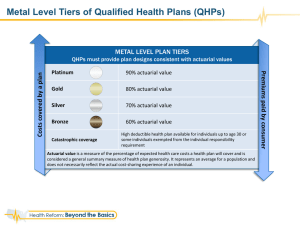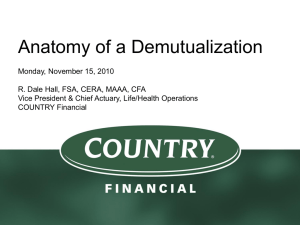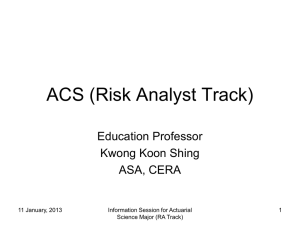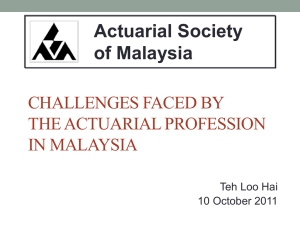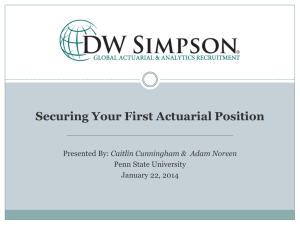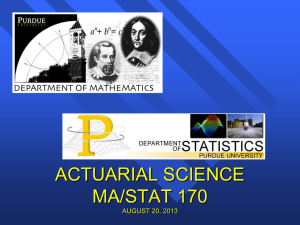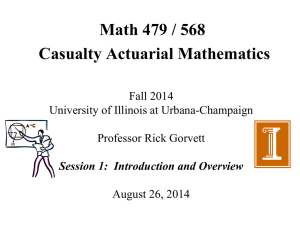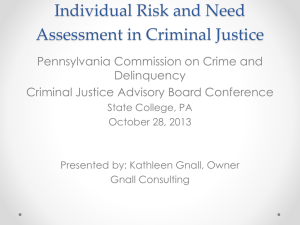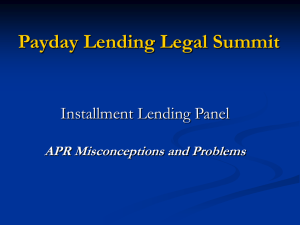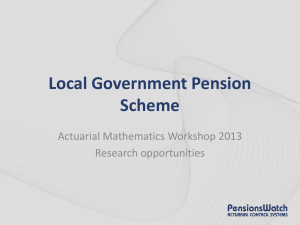ACTU Info Session 12252013 India
advertisement
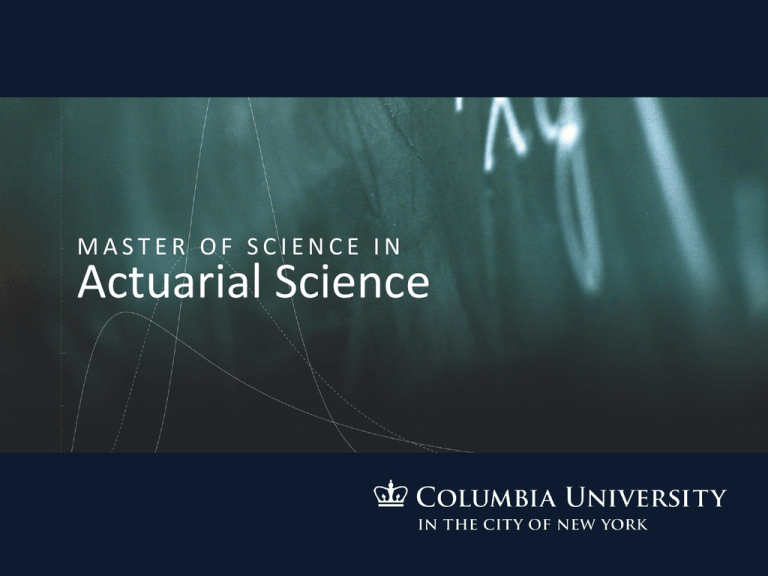
MASTER OF SCIENCE IN Actuarial Science Agenda Industry Trends Program Philosophy and Overview Program Requirements and Curriculum Professional Development and Career Services Navigating the Program Admission Requirements and Deadlines Contact Information Industry Trends General Information Various industries heavily use actuaries in order to manage risk and as a result of steady growth in many of these industries, actuarial science has become an increasingly attractive profession 46% of actuaries work for private insurance companies Insurance Brokers & Agencies 6.9% revenue growth, 1.2% employment growth in 2011 • This includes Life and Health Insurance, Personal Property and Casualty Insurance, Commercial Property and Casualty Insurance, etc. The Actuarial profession has consistently been rated as one of the best jobs to have CareerCast recently ranked it as the best job of 2013 According to the Bureau of Labor Statistics, the actuarial profession is set to grow 27% from 2010-2020 in the United States High demand for actuaries. Relatively few graduate Actuarial Science programs currently in existence. Most professionals come from various majors. What Industries Do Actuaries Enter? INDUSTRY % Insurance companies 46% Consulting firms 34% Miscellaneous 6% State insurance departments and other government offices 2% Investment houses and banks 2% University and college educators 1% TO P E M P L OY E R S O F AC TUARIES # OF AC TUARIES E M P L OY E D Mercer Human Resource Consulting 526 Towers Perrin 415 Watson Wyatt Worldwide 333 Hewitt Associates LLC 199 PricewaterhouseCoopers LLP 153 Buck Consultants Inc. 149 Aon Consulting 128 Program Philosophy and Overview Components of the Program Baseline Foundation Face to Face or Online Exams M.S. in Actuarial Science Career Focused Proseminar Industry Focused Mentors Applied Program Philosophy Rigorous program of study, helps with exams but focuses on practice The program gives students the opportunity to study with some of the best minds in the country, and provides an academic experience that extends beyond the limits of basic test preparation. While passing the preliminary actuarial exams is important, it is of greater importance that students who complete this program leave with a strong foundation in Actuarial Science, and are prepared for to work and excel in their chosen industry. Our top priority is providing students with the tools to move beyond the level of knowledge that is necessary for the actuarial exams, and ensuring that they become deeply skilled in their field of study. An important aspect of accomplishing this goal is making sure that student are able to gain actuarial experience through internships, research projects, and ultimately through full time employment. The responsibility is ultimately on the student to understand the marketplace, network, use all available resources to obtain employment. Program Overview Courses typically meet one or two times a week Working students should be able to complete the program taking evening courses, although many courses are also offered during the day. Students may enroll in the program either fulltime (12 or more credits per term) or part-time (fewer than 12 credits per term). Full-time students complete the program in three semesters, although some will be able to complete it in one calendar year. Part-time students are expected to complete the program in six terms. Individualized programs of study may be developed to accommodate those students who have completed some of the required coursework prior to entering the program as well as those students who wish to do additional coursework in risk management, data analysis, and mathematical finance. Advanced students may take electives in mathematical finance, risk management, and advanced statistical methods. Students can complete program either on campus or online. (Fully online M.S. in Actuarial Science program launches Fall 2014.) Where do program graduates work? Program Requirements and Curriculum Program Requirements – 2013 • GPA > 3.0 • Course completed within 3 years of start date (excludes summer) • 36 points needed – Does not include Proseminar and internships (considered professional requirements) • STAT 4109 (or 4105/4107) and STAT 4840 required with a grade of B- or higher – Certain students can be exempted from 4840 if passed FM. No students can be exempted from 4109. SOA/CAS exam related courses VEE Courses STAT W4109 – Probability / Statistical Inference - 6 pts. – P VEE Stat – STAT W4440 – Linear Regression and Time Series STAT W4840 – Theory of Interest – 3 pts. – FM VEE Corporate Finance – BUSI K4003 – Corporate Finance ACTU K4830 – Stochastic Processes – 3 pts – MFE VEE Economics – ECON 5211 & 5213 – Microeconomics and Macroeconomics ACTU K4821 – Actuarial Methods – 6 pts – MLC ACTU K4823 – Actuarial Models – 3 pts – C VEE Regression/Time Series – STAT W 4440. Linear Regression and Time Series Models (Core Class) Class Information – Core Courses STAT W4105. Probability. 3 pts. (combines in 4109 with 4107) – 4109 is 6 points • Calculus-based introduction of probability. STAT W4107. Statistical Inference. 3 pts. (combines in 4109 with 4105) – 4109 is 6 points • Calculus-based introduction to the theory of statistics. STAT W4840. Theory of Interest. 3 pts. • Introduction to the mathematical theory of interest as well as the elements of economic and financial theory of interest. ACTU K4821. Actuarial Methods. 6 pts. • This course covers the non-stochastic process portions of the MLC/3L exam, and is about pricing and reserving of life insurance. Topics include actuarial present value, the equivalence principle, premiums, three methods of calculating reserves, joint life and multiple hazard. ACTU K4823. Actuarial Models. 3 pts. • This course covers portions of the C/4 exam not covered elsewhere in the curriculum. Topics may include Bayesian statistics, credibility, and risk measures. Class Information – Core Courses ACTU K4830. Stochastic Processes for Actuarial Science. 3 pts. • This course covers the material and the theoretical background for exam MFE. • Review of elements of probability theory including topics such as Poisson processes, exponential distribution, etc. STAT W4440. Linear Regression and Time Series Models. 3 pts. • Survival distributions, types of censored data, estimation for various survival models, nonparametric estimation of survival distributions • Theory and practice of regression analysis with simple and multiple regression. STAT W4606. Elementary Stochastic Processes. 3 pts. STAT W4543. Survival Analysis. 3 pts. Accreditation Requirements Actuarial Exams P / 1: Probability FM / 2: Financial Mathematics MLC / 3L: Life Contingencies (Actuarial Methods) MFE / 3F: Financial Economics C / 4: Actuarial Models Validation By Educational Experience (VEE) Corporate Finance Microeconomics Macroeconomics Regression / Time Series Conversion US and UK Exam (USUK) Society of Actuaries exams passed Subjects for which exemption is offered by the Institute and Faculty of Actuaries Exam P - probability, and VEE statistics CT3 Exam FM - financial mathematics CT1 VEE corporate finance CT2 Exam MLC and C (Both needed) CT4 and CT5 VEE - economics CT7 Exam MFE - financial economics CT8 All modules of fundamentals of actuarial practice (you CA1 must provide evidence that all modules of fundamentals of actuarial practice including assessments, have been passed with the SoA. Students who have been granted an exemption from FAP by the SoA are not eligible to apply for an exemption from CA1) Conversion US and UK Exam (UKUS) Core Technical UK Exam SOA/CAS Exam CT3 Exam P CT1 Exam FM CT2 VEE Corporate Finance CT7 VEE Economics CT4 AND CT5 Exam MLC–Life Contingencies CT6 Exam C and VEE Applied Statistics CT8 Exam MFE–Financial Economics Conversion US and UK Exam (UKUS) Core Application and Specialist Application UK CA1 CA2 SA1 and ST1 SOA exam Fundamentals of Actuarial Practice (FAP) Modules 1–5 and FAP Interim Assessment FAP Modules 6–8 and FAP Final Assessment Exams DP–Design and Pricing and CSP–Company/Sponsor Perspective (Health, Group Life and Managed Care) SA2 and ST2 Exams DP and CSP (Individual Insurance) SA4 and ST4 Exams DP and CSP (Retirement) SA5 and ST5 SA6 and ST6 Exams Advanced Finance/ERM and Financial Economic Theory (Finance/ERM) Exams Advanced Portfolio Management and Financial Economic Theory (Investment Actuarial Exam Course Structure Electives Professional Development and Career Services Preparing for Exams The Actuarial Society at Columbia University is a great tool for students who are preparing to take any of the Preliminary Exam. Through Columbia University, you will have access to various test preparation materials. • Both electronic (Coaching Actuaries online exam preparation) and paper resources (ACTEX manuals & BPP manuals) will be made available to help students study for the preliminary exams. Students will be able to take practice tests in an environment similar to actual testing conditions as well. Career Service Offering Overview Career Center Career Coach Advisors and Mentors Proseminar & Recruiter Empower Career Resources Career Resources Link View industry specific resources to guide your career research and deepen your knowledge of your field of study. http://ce.columbia.edu/student-life-and-alumni-relations/career-services-msstudents The Center for Career Education (CCE) http://www.careereducation.columbia.edu - Resume review - Workshops; career advising appointments - Online resources - Register for LionSHARE, Columbia’s job posting system - Sign up for company presentations, interviews and job fairs Career Resources SCE provides students with support and resources for career management Career Coach For resume review, job search and professional development advice. Program Directors/ Faculty For industry trends, hiring patterns and profiles. Proseminar Series/ Program Specific Events Provide networking opportunities, as well as, educational value. Career Advising Appointments We employ a dedicated recruiting consultant that helps students on an individual basis. Refine your career plans – Update your résumé; review a cover letter – Create a target list of companies – Practice for an interview – Finding an Internship Finding an internship can seem like a daunting task, but there are numerous facilities and programs available on campus to students to help them effectively search for, apply to, and ultimately obtain an internship. • Students can have their resume and cover letter reviewed by engaging in the program’s prescribed resume and cover letter review and revision process. • Proseminar – This course gives students numerous opportunities to network with industry professionals as well as attend a number of employer information sessions. • Job/internship opportunities that are exclusive to the Actuarial Science Program will be posted on the Ning social networking site periodically. Internship Job Search An internship in the actuarial field will increase the probability you will secure a job when you complete the program Most internships are offered for summer but some companies hire interns year round The internship application process is a big part of both the spring and fall semesters, and a variety of resources are available to students to help them find opportunities they are interested in. Large insurance, healthcare and consulting companies with formalized, annual internship programs will interview well in advance Companies that hire on an as needed/project basis will interview and hire into late spring or close to the internship start date Navigating the Program Student Resources After College – A job board that has internship and fulltime positions that are unique to the Columbia University Actuarial Science Program. All students register for this invitation only job board and are then given access to opportunities unique to the Columbia University Actuarial Science Department Proseminar Series Tuesdays and Thursdays from 4:00 to 6:00pm – All students sign up for Proseminar series each semester – There is no charge. – Sample of companies presenting this semester – PricewaterhouseCooper, AIG, SSINC , MetLife, Liberty Mutual ASNY (Actuarial Society of New York) – Students encouraged to sign up for membership – Membership dues are $35 – Access to live monthly seminar(s) for $10-$30 – Past Seminars include topics such as: Special Needs Planning, Personal Financial Risk Management, Longevity Risk Management – The ASNY Career Fair takes place at Columbia University and brings in many top employers. Recruiter Faculty and Program Advisors Career Coach Building Relationships Within the Program Communication Strength in Numbers: – We consider this to be a students greatest asset or liability and as a result place an unique emphasis on helping to facilitate the development of our students communication skills – We like to think of our students as part of a team within the program. Together they are more powerful than alone. – While classes are offered to help with this development, we feel that nothing works better than practice. As such, we encourage our students to not only focus on performing at a high academic level, but also on ensuring that they build relationships within the program throughout their course of study. – In 10 years, we hope that each and every student will have a very powerful network that is rooted in their time here at Columbia. Admission Requirements and Application Deadlines Admission Requirements Applicants must hold at least a bachelor's degree or its equivalent and have a cumulative grade point average of 3.0 or better. Students must have a knowledge of elementary economics (equivalent to ECON W1105), linear algebra (MATH V2010), and multivariate calculus (MATH V1202). The Actuarial Science program can be taken on a full-time or part-time basis. Only international students enrolled in this program full-time qualify for a student visa. Applicants must take and submit their GRE scores to Columbia University at the time of their application. Competitive applicants generally score very well on the quantitative portion of the GRE. Applicants whose native language is not English or have not completed their undergraduate studies at an accredited US college or university are required to demonstrate proficiency in the English language by submitting official scores either from the TOEFL (Test of English as a Foreign Language) or IELTS (International English Language Testing System). • Students required to take the TOEFL exam must score 100 on the computer version, or its equivalent on other versions. Application Deadlines Fall 2014 January 15, 2014; March 15, 2014; May 15, 2014 Spring 2015 October 1, 2014; November 1, 2014 For More Information Please refer to http://ce.columbia.edu/actuarial-science/apply For More Information Program Contact Information Noor Rajah, FSA, FCA, EA, MAAA, CFA Lina Xu, PhD, FSA Program Director Lewisohn Hall (SCE) - 5th Floor Program Coordinators Prajwal Kilari Elena Lambridis For More Information Please contact noor.rajah@columbia.edu Questions? Frequently Asked Questions • Can you switch between part time and full time? • Is it the same cost for in-person, online and the hybrid programs? • Can you tell us more about the online courses? • Are any scholarships offered? • What does it take to be approved for summer courses? • Are the math courses actual prerequisites? In other words, what does “familiar with linear algebra and multivariate calculus” mean?
